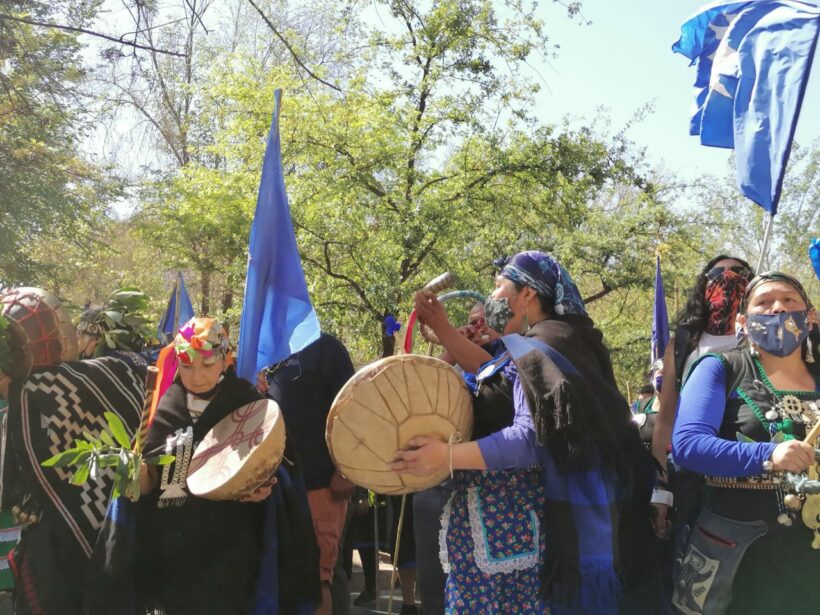In Chile, law 20609 condemns discrimination, whether by virtue of race, ethnicity or gender identity, yet this law has not been widely applied or presented as an argument, let alone met the victims’ need for justice. In the case of the Mapuche people, discrimination and racism have been recurrently evidenced either at a structural level, through the judicial or economic system, among others, and at a symbolic level, through daily acts and hate speech. In the past, despite having been found to be racist, these acts have not been condemned or even identified as such. This situation could be about to change as a Chilean state deputy, Gloria Naveillan, accused of levelling serious slander against a Mapuche Werken, Adán Huentecol, could be on the verge of losing her parliamentary privilege, making it possible for her to be tried on the stipulated charges.
The Mapuche people are an indigenous people living in the south of what is now known as Chile and Argentina. Since the formation of these states, the occupation of Mapuche territory on both sides of the Andes has been an excuse to implement policies aimed at their physical, cultural and spiritual extermination. Invisibilisation, language disappearance, denial of autonomy, imprisonment and murder have been just some of the genocidal strategies used. One of the most frequent and explicit has been the usurpation of their lands, an element that intertwines their worldview and their daily lives. In the struggle for the restitution of territories, many Mapuche communities have resorted to the recovery of their lands, which has been strongly condemned and repressed.
In areas of strong territorial claims and organisation of Mapuche communities, the counter-attack of Chilean or foreign landowners who do not want to lose the privilege of their occupied lands is latent and takes different forms. Organisations such as the Association for Peace and Reconciliation in Araucanía (APRA), which claims to bring together victims of Mapuche violence, in reality cause violence against the Mapuche people, intervening in the processes of self-determination at the expense of the disarticulation of communities, calling for violence and even taking part in false news stories to spread their racist discourse.
One of the leaders of this organisation, Gloria Naivellan, a former member of the Republican Party and now a member of parliament for Araucanía, is being accused of “serious slander and libel” by the Werken (Mapuche authority) Adan Huentecol and his defence lawyer Isabel Figueroa. The Deputy, before taking office, publicly accused the Werken of having made threats against forestry businessman Gerardo Cerda and of being responsible for the burning of machinery on his land. In her statements she also urged that the Mapuche authority be prosecuted. After being charged with the aforementioned offence, she appealed to her parliamentary privilege to have the accusation against her dismissed, despite the fact that the events occurred before she was elected to her seat in the chamber. The appeal filed by Naivillan’s defence was not accepted by the court.
Ms. Naivillan’s history of racist actions does not only go back to this false accusation against Werken Huentecol, but also to other actions. One of the significant events directly involving her occurred in the early hours of 1 and 2 August 2019, when anti-Mapuche citizens were summoned to the municipal offices of Curacautín, Lonquimay, Victoria, Traiguén, Galvarino and Collipulli, in the Araucanía region (an area with a large Mapuche population) to evict members of communities who were “occupying” the offices in support of political prisoners who had been on hunger strike for three months, with sticks and other blunt objects. The peaceful protests were violently evicted by police, military and civilians who responded to the APRA leader’s call.
Werken Rodrigo Curipan told radio Kurruf that this type of defamation by state officials or members of the Chilean political class is not something new in relation to the Mapuche people, but rather a daily practice that has been going on since the beginning of the invasion of their territories. Werken Curipan said: “If we look at history, many other political figures have made a career out of controversial events in the Mapuche area…they use slander or the use of supposed victims to make people think that the Mapuche are a problem for Chilean institutions” Werkén Huentecol added that these actions only seek to slow down the process of territorial recovery and autonomy of the Mapuche communities. Regarding MP Naivillan, both agreed that people like her have made their career through unsubstantiated accusations that cause hatred towards the Mapuche people.
The situation in which Werken Adan Huentecol was put by Naveillan could have had fatal consequences, if he had been persecuted by civilians sympathetic to the anti-Mapuche cause because of these statements. Without going any further, Werken Curipan also told Radio Kurruf that in this case “there was political and criminal persecution against him (Huentecol)” and that his personal, family and community life was strongly affected.
Chile is a signatory to the United Nations International Convention on the Elimination of All Forms of Racial Discrimination, which condemns “practices of segregation and discrimination”, prohibits racism and discrimination, and ensures that signatory states undertake “not to engage in any act or practice of racial discrimination against persons or groups of persons”. The state must ensure that its citizens and especially government representatives do not engage in violations of this convention. The case of hate speech in 2019 had no legal consequences for those who promoted it. It is to be hoped that in the case of the insults and slander against the Mapuche authority Adan Huentecol, it will be possible to demonstrate that fascist acts and set-ups will not go unnoticed in the country, that, on the contrary, they will find justice and reparation. The trial of today’s deputy Naveillan would be a step towards demonstrating political will against racism and, at the very least, a sign that the Chilean state respects its own laws.






